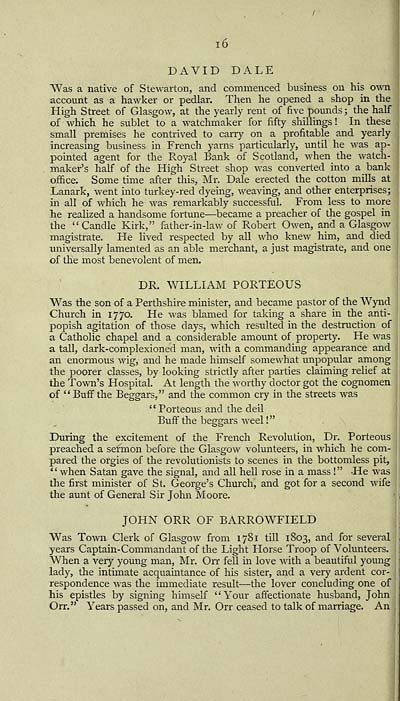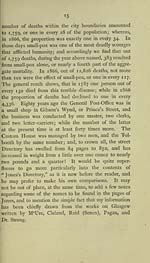Towns > Glasgow > 1787 - Reprint of Jones's directory; or, Useful pocket companion for the year 1787
(24)
Download files
Complete book:
Individual page:
Thumbnail gallery: Grid view | List view

i6
DAVID DALE
Was a native of Stewarton, and commenced business on his own
account as a haMdcer or pedlar. Then he opened a shop in the
High Street of Glasgow, at the yearly rent of five pounds ; the half
of which he sublet to a watchmaker for fifty shillings! In these
small premises he contrived to carry on a profitable and yearly
increasing business in French yarns particularly, until he was ap-
pointed agent for the Royal Bank of Scotland, when the watch-
maker's half of the High Street shop was converted into a bank
office. Some time after this, Mr. Dale erected the cotton mills at
Lanark, went into turkey-red dyeing, weaving, and other enterprises;
in all of which he was remarkably successful. From less to more
he realized a handsome fortune — became a preacher of the gospel in
the "Candle Kirk," father-in-law of Robert Owen, and a Glasgow
magistrate. He lived respected by all who knew him, and died
imiversally lamented as an able merchant, a just magistrate, and one
of the most benevolent of men.
DR. WILLIAM PORTEOUS
Was the son of a Perthshire minister, and became pastor of the Wynd
Church in 1770. He was blamed for taking a share in the anti-
popish agitation of those days, which resulted in the destruction of
a Catholic chapel and a considerable amount of property. He was
a tall, dark-complexioned man, with a commanding appearance and
an enormous wig, and he made himself somewhat unpopular among
the poorer classes, by looking strictly after parties claiming relief at
the Town's Hospital. At length the worthy doctor got the cognomen
of " Buff the Beggars," and the common cry in the streets was
'* Porteous and the deil
Buff the beggars weel !"
During the excitement of the French Revolution, Dr. Porteous
preached a sermon before the Glasgow volunteers, in which he com-
pared the orgies of the revolutionists to scenes in the bottomless pit,
"when Satan gave the signal, and all hell rose in a mass !" -He was
tlie first minister of St. George's Church, and got for a second wife
the aunt of General Sir John Moore.
JOHN ORR OF BARROWFIELD
Was Town Clerk of Glasgow from 1781 till 1803, and for several
years Captain- Commandant of the Light Horse Troop of Volunteers.
When a veiy young man, Mr. Oit fell in love with a beautiful young
lady, the intimate acquaintance of his sister, and a very ardent cor-
respondence was the immediate result — the lover concluding one of
his epistles by signing himself "Your affectionate husband, John
Orr." Years passed on, and Mr. Orr ceased to talk of marriage. An
11
DAVID DALE
Was a native of Stewarton, and commenced business on his own
account as a haMdcer or pedlar. Then he opened a shop in the
High Street of Glasgow, at the yearly rent of five pounds ; the half
of which he sublet to a watchmaker for fifty shillings! In these
small premises he contrived to carry on a profitable and yearly
increasing business in French yarns particularly, until he was ap-
pointed agent for the Royal Bank of Scotland, when the watch-
maker's half of the High Street shop was converted into a bank
office. Some time after this, Mr. Dale erected the cotton mills at
Lanark, went into turkey-red dyeing, weaving, and other enterprises;
in all of which he was remarkably successful. From less to more
he realized a handsome fortune — became a preacher of the gospel in
the "Candle Kirk," father-in-law of Robert Owen, and a Glasgow
magistrate. He lived respected by all who knew him, and died
imiversally lamented as an able merchant, a just magistrate, and one
of the most benevolent of men.
DR. WILLIAM PORTEOUS
Was the son of a Perthshire minister, and became pastor of the Wynd
Church in 1770. He was blamed for taking a share in the anti-
popish agitation of those days, which resulted in the destruction of
a Catholic chapel and a considerable amount of property. He was
a tall, dark-complexioned man, with a commanding appearance and
an enormous wig, and he made himself somewhat unpopular among
the poorer classes, by looking strictly after parties claiming relief at
the Town's Hospital. At length the worthy doctor got the cognomen
of " Buff the Beggars," and the common cry in the streets was
'* Porteous and the deil
Buff the beggars weel !"
During the excitement of the French Revolution, Dr. Porteous
preached a sermon before the Glasgow volunteers, in which he com-
pared the orgies of the revolutionists to scenes in the bottomless pit,
"when Satan gave the signal, and all hell rose in a mass !" -He was
tlie first minister of St. George's Church, and got for a second wife
the aunt of General Sir John Moore.
JOHN ORR OF BARROWFIELD
Was Town Clerk of Glasgow from 1781 till 1803, and for several
years Captain- Commandant of the Light Horse Troop of Volunteers.
When a veiy young man, Mr. Oit fell in love with a beautiful young
lady, the intimate acquaintance of his sister, and a very ardent cor-
respondence was the immediate result — the lover concluding one of
his epistles by signing himself "Your affectionate husband, John
Orr." Years passed on, and Mr. Orr ceased to talk of marriage. An
11
Set display mode to: Large image | Transcription
Images and transcriptions on this page, including medium image downloads, may be used under the Creative Commons Attribution 4.0 International Licence unless otherwise stated. ![]()
| Scottish Post Office Directories > Towns > Glasgow > Reprint of Jones's directory; or, Useful pocket companion for the year 1787 > (24) |
|---|
| Permanent URL | https://digital.nls.uk/85272087 |
|---|
| Description | Directories of individual Scottish towns and their suburbs. |
|---|
| Description | Around 700 Scottish directories published annually by the Post Office or private publishers between 1773 and 1911. Most of Scotland covered, with a focus on Edinburgh, Glasgow, Dundee and Aberdeen. Most volumes include a general directory (A-Z by surname), street directory (A-Z by street) and trade directory (A-Z by trade). |
|---|


